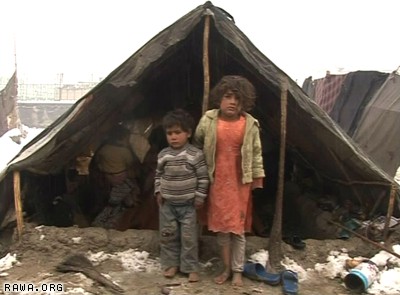Over 1,000 families in a camp for internally displaced persons (IDPs) in Kandahar Province, southern Afghanistan, have opted to return to their home areas in the north and northwest of the country because of worsening insecurity and lack of aid at the camp.

IDPs in Kabul.
Zherai Dasht camp, about 25km west of Kandahar city, was home to hundreds of thousands of IDPs in 2002-2005. Most have returned home over the past four years but some 3,000 families still live in the camp, according to the provincial department of refugees.
Mohammad Azam Nawabi, director of the refugees’ department in Kandahar, told IRIN 1,087 families had formally expressed their desire to return.
Nawabi, and several camp residents, said the IDPs wanted to go to their home areas because of the insecurity, lack of aid and grinding poverty.
“We left our homes [in Faryab Province, northern Afghanistan] because of insecurity and now we are leaving this camp because of the same problem,” said Abdul Wahid, adding that Taliban and pro-government forces had been harassing camp residents.
“There is no water, no health clinic, no doctor, no school and no job for us in the camp… How can people live here,” said another man, Sahib Jan.
Uncertain future
Most of the IDPs who had registered to return said they had had no assurances their living conditions would improve when they returned to their places of origin.
“Only God knows what will happen to us when we go back to our homes,” said Abdul Bari from the northern province of Maimana.
Returning IDPs will receive a cash grant for transport and food aid to help them back to Badghis, Faryab, Maimana, Balkh and Jozjan provinces, said Nawabi.
According to a study by the US-based Brookings Institution, many returning IDPs face serious reintegration difficulties in their original areas due to the lack of access to basic services - drinking water, healthcare, employment and education.
“Evidence suggests that those who opt to return, soon find themselves again displaced, this time as economic migrants who are more easily dismissed by provincial authorities and largely ignored by relief agencies,” said the study.
Ethnic Pashtuns
In 2002, about 1.2 million people became internally displaced, most of them ethnic Pashtuns who left their homes in northern and northwestern provinces out of fear of ethnic cleansing by victorious anti-Taliban Tajik, Uzbek and Hazara militias.
Aid agencies supported many of these IDPs in camps in Kandahar, Helmand and Herat provinces until 2006 when the UN Refugee Agency (UNHCR) and the government officially halted the aid programme in a bid to end protracted displacements and encourage people to return to their original areas.
“In 2008 IDPs’ rights to security and life-saving assistance continued to be under threat in a number of countries, including Afghanistan,” stated a report by the Norwegian Refugee Council’s (NRC’s) Internal Displacement Monitoring Centre, released in April.
About 235,000 individuals are believed to be still internally displaced, most of them a protracted caseload concentrated in three IDP camps in Herat, Helmand and Kandahar provinces, according to the UNHCR and the government.
Thousands of people were also forced out of their homes and villages in 2008 because of armed hostilities between insurgents and Afghan government and international forces, aid agencies said.
Government officials say IDPs will be assisted to return and re-integrate in their home areas, but the NRC report said the authorities were unable to ensure the implementation of laws and policies in insecure areas.



